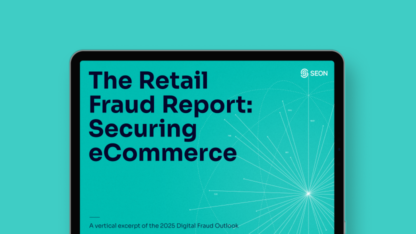A Comprehensive Guide to Making Informed Choices On Selecting Your Fraud Prevention Solution
Did you know that 46% of businesses worldwide have faced economic crime in recent years, while cyber risk remains a top concern for CEOs? Further, 49 percent of CEOs place cyber risk at the top of their concerns for the year ahead. Those choosing to build a fraud solution often do so because they want customizable control over the build, data and costs involved. Yet off-the-shelf platforms can also cater to these needs – without requiring the significant upfront investment in research and development.
Ultimately, the decision to buy or build a fraud detection solution should be rooted in a combination of the following:
- Available resources of internal teams weighted against project priorities
- Your business’ specific needs
- An informed long-term strategy
As a proactive, end-to-end anti-fraud platform, SEON offers a surefire way for companies to effectively and efficiently prevent fraud, protect their customers – and safeguard their bottom line.
Common Pitfalls of Building
When companies opt to build their anti-fraud solution, they often face unanticipated challenges, including:
- Underestimating complexity and resource requirements
- Misjudging timelines
- Running over budget, straining financial resources
- Expertise diverted from critical business areas
In building a fraud prevention platform to address immediate fraud concerns, many fail to create systems that can adapt to evolving threats. This leads to an undesirable reliance on disparate point solutions, yielding a cumbersome or inoperable tech stack. Too narrow of a focus on current needs sets up lackluster futureproofing capacities, leaving companies with inadequate or outdated fraud protection measures. With maintenance overlooked and scaling capabilities unaccounted for, pressure mounts on development teams, hampering a company’s primary objectives to protect themselves in the first place.
Weighing the Benefits
Grappling with the decision to construct a fraud prevention solution from scratch or invest in a pre-existing solution requires understanding each approach’s nuances. Building a bespoke platform or purchasing an end-to-end offering is not a straightforward choice, as there are many factors to weigh:
- Data Privacy Considerations
A paramount concern for businesses that must comply across a variegated regulatory landscape, data privacy considerations sway some to build to mitigate risks and keep data in-house. However, retaining data internally does not guarantee immunity from breaches. When selecting a solution, companies should prioritize one that ensures robust data protection and aligns with international data privacy regulations, demonstrated by credentials such as SOC2 certifications. - Integration Challenges
Seamless integration with existing technology infrastructure is another crucial factor. The misconception that in-house solutions integrate more effectively can lead to overlooked challenges and complexities, including time and resource drag. An API-first solution is often more advantageous, ensuring easy and speedy integration with existing data libraries and providing immediate access to product updates without extensive code reconfiguration. - The Case for Building a Custom Solution
Businesses often contemplate crafting a tailored anti-fraud solution, particularly when focusing on specific types of fraud, such as bot attacks or account takeovers. While there is an appeal in the potential of such systems to be built and precisely tuned to unique business needs, these custom-built solutions – adept at addressing particular fraud scenarios – frequently fall short in evolving alongside emerging threats. It also may inadvertently introduce vulnerabilities into other aspects of the customer journey, hampering business growth due to a lack of scalability and adaptability.
Advantages of Purchasing an End-to-End Solution
In contrast, an all-encompassing fraud solution offers holistic protection, scaling alongside a business and adapting to the shifting sophisticated tactics of fraudsters. Comprehensive fraud prevention solutions often feature customizable rules and scoring systems, providing businesses with a desired level of control and transparency tailored to their specific risk appetites. An ideal platform leverages whitebox and blackbox machine learning models, delivering the benefits of transparency, control and automated decisioning while continually refining for accuracy and accounting for expanding fraud exposure.
Making the Strategic Choice
Developing an in-house anti-fraud solution or opting for a pre-built platform hinges on a company’s specific circumstances. With expertise a key element, risk teams and fraud departments must realistically assess their own team’s knowledge and capabilities regarding fraud detection and management. They must also consider their capacity to cultivate expertise, sustain awareness of the evolving fraud landscape, and their available bandwidth to adapt a bespoke platform to changing fraud tactics. In essence, buying or building are both choices with their own merits. Still, the optimal choice should align with an organization’s ability to effectively and efficiently combat fraud while supporting the maturation and growth of the business. When evaluating vendors, finding a trusted end-to-end solution like SEON to partner with can expedite balancing the urgency of needs and current commitments while deploying the protective and preventive measures required to mitigate losses to fraud.







